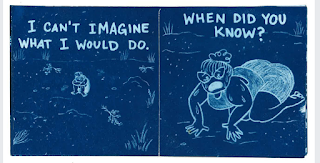Beth Hetland has been illustrating and co-writing some big projects in the past few years, but now she's gotten back to writing and drawing her own material. (The book she's working on right now is going to make people's heads explode!) Fallow Fields is a minicomic about a figure in a field, struggling with trying to make something grow. At the same time, she is beset by a torrent of platitudes, questionable statements of "support," comments that make it all about the speaker, and also genuine expressions of concern and support. All the while, the figure pulls out weeds, fervently tilling the land in an effort to clear it out--to no avail. She collapses, weeping, even as the platitudes pile up. She starts to grow and fill up the tract around her, and tiny versions of her start to clip and mow and tend to her. There is a tacit feeling of radical acceptance at the end, as the voices of others echo away. There are any number of ways to interpret this (though a few seem more likely than others), so I won't speculate as to specific meanings. This comic is really about sitting with a certain reality and coming to terms with it. The white ink on blue background adds to its sense of melancholy, There is a powerful, visceral quality to the cartooning, as Hetland's line is thick and the figure she uses is drawn as desperately strong. There is an intimacy here that I haven't seen in Hetland's past work, and she's bold in expressing vulnerability.
Andi Santagata is a lot of things as a cartoonist, but what I like best about his work is his sense of humor. While he mostly draws horror or horror-inspired comics, at heart, he's a humorist. This is also true of his two memoir minicomics, The Compleat Trans Man Walking and Yennefer's Body. There is a tension in his scratchy, scribbly expressive work between a brash & funny humorist and a person programmed to say as little and take up as little space as possible. Trans Man Walking is a 2016 journal of his initial transition, his battles with his mom, and adjusting to life as a man. There's also a very funny version of the CCS audition comic, involving a robot and a snowman, and Santagata turns it into a gag that's also hilariously tragic. That's true of much of this comic, though there are small moments of triumph like the delight at casually being referred to as a "fella" by a bartender. Santagata's art is so beautifully scratchy and his caricatures so exaggerated that he would have made a fine editorial cartoonist in a different era.
If Trans Man Walking reflects the way it was assembled (haphazardly, and as part of an immediate engagement with the internet), then Yennefer's Body reflects a great amount of thematic care and planning. This is a sequel and continuation of the story from Trans Man Walking, but it more closely fits the themes related to laughing things off, especially pain, so as not to draw attention of any kind. Of course, this approach led Santagata to ignore a huge tumor that eventually caused an enormous amount of blood loss and nearly killed him. The entire comic is an attempt to come to terms with that mortality, mediated through video games and TV shows. The video game Dragon Age is the biggest touchstone, especially as its main character has to find a way to cheat death against the will of her mother. Despite his near-death, Santagata can't shake the feeling that he was still somehow making a big deal out of nothing. There is an obvious mirror here established in his previous comics, where Santagata's mother takes his transition, his tattoos, and every avenue of self-expression as a personal offense.
This is explored further here a bit more obliquely, on blood-red pages splattered and smeared with black ink that approximates a female shape. There's a torrent of abusive, inappropriate, and narcissistic language that Santagata obviously ignored that blames him and accuses him of trying to make his mom "look bad." That's entirely in line with Santagata going an entire day as a kid with a broken arm that no one notices because he doesn't complain. (Santagata cleverly ties this in with an episode of Malcolm In The Middle where Malcolm stops complaining but then develops a stomach ulcer.) It is Yennefer, a character from the show The Witcher, who is the final touchstone, as she also has to undergo a highly painful transformation that renders her infertile. Santagata is finally given a chance to get on testosterone, something that had been unavailable to him during his transition, as a life-saving measure against the tumor and losing so much blood. The result of this also made him infertile, something he's OK with...but it's still a change. The whole thing is a pun on the feminist comedy-horror film Jennifer's Body, which is about a woman turned into a succubus who must be stopped by her best friend. That is another film about transformation, trauma, and refusing to listen to marginalized people.
This is a horror story, and the aesthetic matches it: black pages, red ink, scratchy & monstrous figures, and the comics equivalent of jump scares. It's also funny and sweet, as the sheer obliviousness of Santagata's stand-ins, who are so thoroughly programmed to not complain and minimize everything, literally have to be taken to the edge of death and beyond to acknowledge and live in that trauma. This comic represents every angle Santagata can think of in approaching that journey into entirely-avoidable near-oblivion, and the examples he picks do something very important: they emphasize the danger instead of minimize it. These two comics are a hell of a one-two graphic medicine punch.







No comments:
Post a Comment